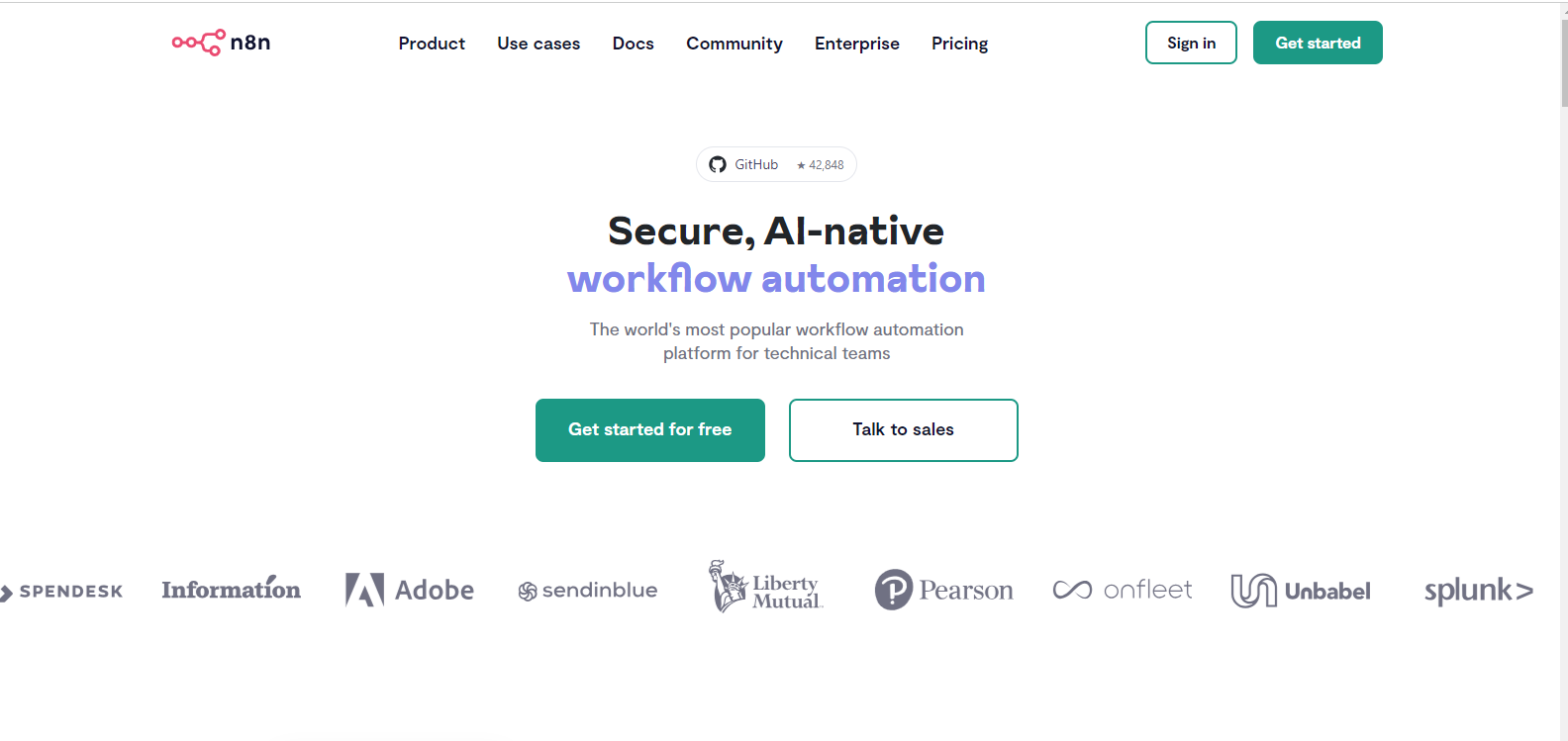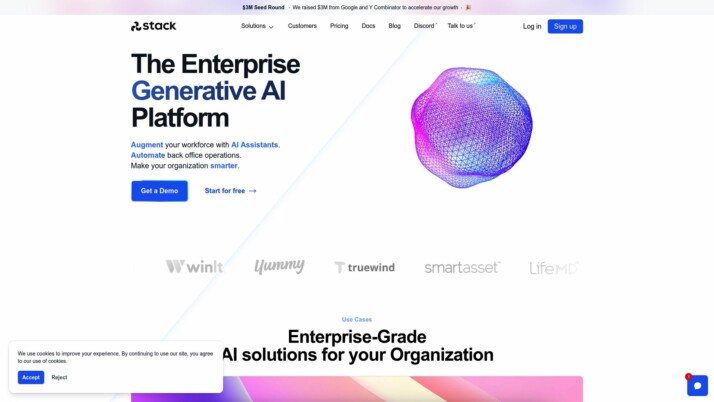AI-powered workflow automation transforms business operations, enhancing efficiency and unlocking new capabilities. Our comparison of n8n vs. Stack AI, and SmythOS reveals distinct approaches to this challenge. n8n offers a flexible, fair-code platform for connecting applications without extensive coding. Stack AI specializes in AI-powered workflows and custom assistants with enterprise-grade security.
SmythOS emerges as the comprehensive solution, combining workflow automation with advanced AI capabilities. This review explores each platform’s strengths, limitations, and ideal use cases, empowering you to choose the right tool for your organization’s needs. Whether you’re a developer seeking powerful integrations, a business leader focused on scalability and compliance, or a non-technical user looking for accessible AI solutions, our analysis provides the insights to inform your decision and drive your AI automation strategy forward.
n8n Overview
n8n empowers users to automate workflows without extensive coding knowledge. This fair-code platform combines visual programming with powerful customization options, making it accessible to both technical and non-technical users.

At its core, n8n offers a drag-and-drop interface for creating complex workflows. Users can connect various applications and services, automating tasks across different platforms. The visual builder simplifies the process of designing intricate automation sequences, while still allowing for custom code integration when needed.
n8n stands out with its extensive library of pre-built integrations, covering popular tools like Slack, Google Sheets, and Typeform.
n8n stands out with its extensive library of pre-built integrations, covering popular tools like Slack, Google Sheets, and Typeform. This wide range of connectors enables users to create sophisticated workflows that span multiple services. The platform also supports custom nodes, allowing developers to extend functionality and integrate with proprietary systems.
While n8n excels in workflow automation, it has limitations. The platform doesn’t offer built-in AI capabilities or autonomous agents, focusing instead on user-defined automation sequences. Additionally, while n8n provides robust logging and monitoring features, it lacks advanced AI-specific tools like explainability frameworks or multi-agent collaboration systems.
n8n’s fair-code model strikes a balance between open-source flexibility and commercial viability. This approach fosters a vibrant community of contributors while ensuring sustainable development. However, users should be aware of the licensing restrictions on commercial use, which may impact certain deployment scenarios.
In the competitive landscape of workflow automation tools, n8n positions itself as a versatile, community-driven option. Its strength lies in combining ease of use with extensibility, making it suitable for a wide range of automation needs across various industries and user skill levels.
Stack AI Overview
Stack AI empowers organizations to harness generative AI for complex business process automation. This low-code platform enables users to create and deploy AI-powered workflows and custom AI assistants without extensive coding expertise.

Stack AI’s visual drag-and-drop interface simplifies AI application development, making advanced capabilities accessible to users across technical skill levels. The platform prioritizes enterprise-grade security, complying with SOC 2, HIPAA, and GDPR standards to ensure data protection and privacy.
Stack AI’s visual drag-and-drop interface simplifies AI application development, making advanced capabilities accessible to users across technical skill levels.
Users can deploy Stack AI applications through customizable interfaces or API endpoints, integrating seamlessly with popular services like Google Drive, Salesforce, and Slack. The platform’s library of pre-built templates for common use cases accelerates implementation, while dedicated support from AI professionals ensures smooth project execution.
Stack AI has delivered tangible solutions across industries. The Physician Co-Pilot assists doctors by retrieving patient information and generating reports. A Hospital CSR Assistant drafts email responses based on policies, while an Investment Memo Generator combines web search data with specific guidelines. These examples showcase Stack AI’s versatility in addressing diverse business needs.
By democratizing access to AI capabilities, Stack AI aims to revolutionize how organizations leverage technology for enhanced efficiency and decision-making. The platform’s vision centers on making advanced AI integral to businesses of all sizes, driving significant value across sectors through custom, accessible AI solutions.
Feature Comparison
n8n and Stack AI offer contrasting approaches to workflow automation and AI integration. n8n excels in providing a flexible, fair-code platform for connecting various applications and automating tasks without extensive coding. Its visual builder and extensive pre-built integrations enable users to create sophisticated workflows spanning multiple services. However, n8n lacks built-in AI capabilities and autonomous agents, focusing instead on user-defined automation sequences.
Stack AI, on the other hand, specializes in AI-powered workflow creation and custom AI assistant development. Its low-code platform emphasizes generative AI capabilities, allowing users to build and deploy AI applications with minimal programming expertise. Stack AI provides enterprise-grade security features and supports the creation of AI assistants for specific use cases like medical report generation and customer service automation.
The platforms diverge significantly in their core components and security features. While n8n offers robust logging and monitoring for workflow execution, it doesn’t provide advanced AI-specific tools like explainability frameworks or multi-agent collaboration systems. Stack AI, conversely, focuses on AI-driven solutions with features for customizing AI behavior and ensuring compliance with security standards like SOC 2 and HIPAA. This emphasis on AI integration and security makes Stack AI more suitable for organizations seeking to implement advanced AI capabilities within their workflows, particularly in regulated industries.
Feature Comparison Table
| n8n | Stack AI | SmythOS | |
|---|---|---|---|
| CORE FEATURES | |||
| AI Agents | ❌ | ✅ | ✅ |
| No-Code Options | ❌ | ✅ | ✅ |
| Memory & Context | ❌ | ✅ | ✅ |
| Autonomous Agents | ❌ | ✅ | ✅ |
| Multi-Agent Collaboration | ❌ | ✅ | ✅ |
| Human-AI Interaction | ❌ | ✅ | ✅ |
| SECURITY | |||
| Constrained Alignment | ❌ | ❌ | ✅ |
| IP Control | ❌ | ❌ | ✅ |
| COMPONENTS | |||
| Foundation AIs | ❌ | ✅ | ✅ |
| Huggingface AIs | ❌ | ❌ | ✅ |
| Classifiers | ❌ | ✅ | ✅ |
| Data Lakes | ❌ | ✅ | ✅ |
| DEPLOYMENT OPTIONS (EMBODIMENTS) | |||
| Staging Domains | ❌ | ✅ | ✅ |
| Production Domains | ❌ | ✅ | ✅ |
| Deploy as Scheduled Agent | ✅ | ❌ | ✅ |
| Deploy as GPT | ❌ | ✅ | ✅ |
| DATA LAKE SUPPORT | |||
| Hosted Vector Database | ❌ | ✅ | ✅ |
| Sitemap Crawler | ❌ | ❌ | ✅ |
| YouTube Transcript Crawler | ❌ | ❌ | ✅ |
| URL Crawler | ❌ | ✅ | ✅ |
Best Alternative to n8n and Stack AI
SmythOS stands out as the superior alternative to n8n and Stack AI, offering a comprehensive platform for AI agent development and deployment. We combine the best of both worlds: the flexibility of n8n’s workflow automation and the AI-centric approach of Stack AI, while surpassing both in key areas.
Our platform excels in ease of use, featuring an intuitive drag-and-drop interface that simplifies the creation of complex AI workflows. Unlike n8n, which lacks built-in AI capabilities, SmythOS provides a rich ecosystem of AI models and integrations, allowing users to harness the power of artificial intelligence without extensive coding knowledge.
SmythOS outshines Stack AI with its unparalleled feature set. While Stack AI focuses on specific AI use cases, we offer a versatile platform supporting a wide range of applications.
SmythOS outshines Stack AI with its unparalleled feature set. While Stack AI focuses on specific AI use cases, we offer a versatile platform supporting a wide range of applications. Our multi-agent collaboration feature enables the creation of sophisticated AI systems that can tackle complex tasks cooperatively, a capability absent in both n8n and Stack AI.
One of our key advantages is the ability to deploy AI agents across various environments. Whether you need to integrate AI into existing systems, create standalone applications, or deploy agents as chatbots or scheduled tasks, SmythOS provides the flexibility to do so with ease. This versatility, combined with our robust security features and scalability, makes us the ideal choice for businesses of all sizes looking to leverage AI technology effectively.
By choosing SmythOS, you’re not just selecting an AI platform; you’re embracing a future-proof solution that continually evolves to meet the changing demands of AI technology. Our commitment to innovation ensures that your AI initiatives will always have access to cutting-edge capabilities, positioning your business at the forefront of the AI revolution.
Conclusion
Comparing n8n, Stack AI, and SmythOS reveals distinct approaches to workflow automation and AI integration. n8n excels in connecting various applications with its fair-code model and extensive pre-built integrations. Stack AI focuses on AI-powered workflows and custom AI assistants, emphasizing enterprise-grade security. However, SmythOS emerges as the superior choice, offering a comprehensive solution that combines the strengths of both platforms while addressing their limitations.
SmythOS stands out with its versatile drag-and-drop interface, extensive integration ecosystem, and support for multiple AI models. Unlike n8n, SmythOS provides built-in AI capabilities and autonomous agents, enabling more advanced automation scenarios. Compared to Stack AI, SmythOS offers greater flexibility in deployment options and a wider range of pre-built templates and integrations.
The platform’s ability to create multi-agent systems, support for multimodal interactions, and advanced features like explainability and debugging set SmythOS apart. Its ’Create Once, Deploy Anywhere’ approach allows users to build agents that seamlessly integrate across various environments, from APIs to chatbots and scheduled tasks. This versatility, combined with enterprise-grade security and scalability, makes SmythOS an ideal choice for businesses of all sizes looking to leverage AI in their operations.
For those ready to experience the future of AI-powered automation, explore SmythOS’s diverse range of AI-powered agent templates to jumpstart your journey. To see how SmythOS can transform your workflow and unleash the full potential of AI for your business, create a free SmythOS account and start building your first AI agent today. With unlimited agents and a risk-free trial, there’s never been a better time to revolutionize your approach to AI automation.